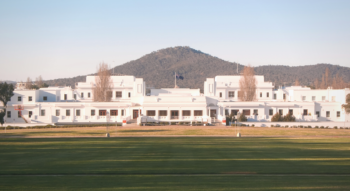Episode Notes
Would you switch to greener super if it meant more money at retirement? But is the benefit worth the hassle? As climate change makes itself felt in our everyday lives, we explore how our choice of superannuation fund can cost us in the long run if we don’t pay attention to climate-friendly investment now. In this episode, Professor Jacqueline Peel, Director of Melbourne Climate Futures talks about how it’s possible to prompt climate action by strategic superannuation investment. Professor Wai Fong Chua also reveals just what it will take for big businesses to disclose climate-related material risk.
Transcript
Mark McVeigh (00:03):
It all just kind of snowballed over time. At no point did I decide one day to take my superannuation to the federal court.
Ginger Gorman (00:10):
Mark McVeigh is an ecologist and climate activist. In 2018, he sued his superannuation provider.
Mark McVeigh (00:18):
It all kind of just started with asking some really simple questions to kind of figure out exactly what they were doing in terms of climate policy and investing my money. And once they couldn’t really give me the answers I was looking for, I kind of got in touch with people and tried to figure out exactly why I couldn’t have this information, and whether I kind of should be given it.
Ginger Gorman (00:40):
In a nutshell, he sued because they couldn’t provide him with information on how they were managing the risks of climate change.
Mark McVeigh (00:48):
One thing was the whole idea of stranded assets and the idea that a lot of money that’s being invested now is potentially in industries and in certain projects that are going to be valued a lot less or decline dramatically as climate change impacts increase. So I guess that was part of it, is the financial risk. The other part was just wanting to know more about where my money is and whether it’s contributing to climate change impacts and that kind of thing as well. So I guess that was a driver there was wanting to know more, wanting to know exactly what’s happening with my money and what’s going to happen to it between now and when I’m able to access it when I’m 60, 70 years old.
Ginger Gorman (01:30):
It was the first case of its kind in Australia. And for an ecologist like Mark, who really felt the impacts of climate change were being dismissed by politicians and by corporations, pointing out that climate change was impacting the bottom line was a smart move.
Professor Jacqueline Peel (01:48):
Ultimately, because a business model based on a carbon economy is not sustainable.
Ginger Gorman (01:54):
Jacqueline Peel is a professor in the Melbourne Law School and director of Melbourne Climate Futures. She’s also a fellow of the Academy of the Social Sciences in Australia.
Professor Jacqueline Peel (02:05):
We know we need to transition away from fossil fuels and away from a carbon-based economy. The faster we do that, we also know the cheaper it will be and the smoother the transition will be. The slower it occurs, the more expensive it’s going to be. So if you’re invested in banks or other businesses that are really slow to transition, then likely they’re going to be racking up greater costs. They might be putting their business at risk. It might mean that in the future your bank collapses or your superannuation fund can’t give you the kinds of profits on your investments for your retirement. So really, it just makes good sense to look into how fast they’re transitioning and how serious they are about moving away from fossil fuels, because that’s your money and your money needs to be invested in a smart future, in a clean green future, otherwise it’s at risk.
Ginger Gorman (03:06):
This is Seriously Social, I’m Ginger Gorman and on the podcast today, What does climate change cost us even if we don’t live in the flood and fire prone areas that are being directly affected? Maybe it won’t destroy your home or your livelihood, but will it cost you your life savings?
(03:29):
I’ve been passionate about environmental causes for most of my life, so I think it’s only fair to start by acknowledging that I know not everyone has the time or mental energy to be a climate activist. You might have another cause that’s more important to you or you might just be trying to live your life and you don’t really care all that much about activism. Fair enough. So I have some good news for you about this episode. Here we’re talking about the responsibilities of business, not just individuals to address climate change. I’ll come back to Professor Jacqui Peel soon, but what’s required of businesses in Australia right now when it comes to reporting climate risk?
Professor Wai Fong Chua (04:26):
Currently in Australia, we don’t have any mandatory rule for businesses to report.
Ginger Gorman (04:35):
Wai Fong Chua is a professor of accounting at the University of Sydney and she’s a fellow of the Academy of the Social Sciences in Australia. She says that while companies don’t technically have to report their climate risk, some are starting to do it anyway.
Professor Wai Fong Chua (04:51):
There are a number of listed organizations or companies that have started to attempt to measure climate-related risks and to report them publicly. So for example, if you think about the Commonwealth Bank of Australia, it’s one of the larger organizations that have been publishing such reports. Superfunds have also started to produce reports attempting to measure and disclose their climate-related risk. So in some earlier research that a colleague and I, Tanya Fiedler did, we looked at the accounts of some 50 organizations in Australia. So there are organizations seeking to measure such risk. It’s completely on a voluntary basis.
Ginger Gorman (05:45):
What is happening to make those companies feel that they need to be doing this, they need to be showing in their financials that they are addressing this problem?
Professor Wai Fong Chua (05:55):
I think the pressure comes from a number of sources. Certainly in terms of regulators for the banks, for example, APRA has been quite active in seeking information from banks as to their exposure to climate-related risks.
Ginger Gorman (06:16):
The Australian Prudential Regulation Authority, known as APRA, is an independent statutory authority that supervises institutions across banking, insurance and superannuation, and promotes financial system stability in Australia.
Professor Wai Fong Chua (06:32):
APRA is very keen for them to actually conduct what we call scenario analysis, for them to see what are the possible scenarios in the future and how would that affect the financial stability and wellbeing of the banks.
Ginger Gorman (06:49):
The former commissioner of the Australian Securities and Investments Commission, John Price, was also vocal about the importance of reporting climate risk.
Professor Wai Fong Chua (06:59):
And he stated very clearly in a public forum that if climate risks are something that you experience, well then it’s a risk no different from any other risk. So you should disclose.
Ginger Gorman (07:13):
While business isn’t required by law to disclose climate risk specifically, there is an existing law that requires them to disclose material risks to their businesses and also a duty for company directors to act in the best interests of the company. The question is, does this cover climate risk? Here’s Professor Jacqueline Peel again.
Professor Jacqueline Peel (07:37):
Many years ago it would’ve been the case where you’d say, “Well that doesn’t mean that they need to do anything on climate change,” because that wasn’t seen as a material risk to their business. But that’s really changing and if you sort of think about the floods and the fires, all of the kind of climate impacts that we are seeing, how much that’s impacting our society, how much it’s impacting our economy. Businesses are also waking up to the fact that this is not something that’s external to business and profit, it very directly impacts on the capacity of businesses to earn profits.
(08:10):
If you think too about banks and superannuation funds that have a lot of investments still in fossil fuels, in coal mines and so on, if those kinds of assets are not going to be able to be maintained over time, if they’re holding those assets on their books, their value is going to decrease, and that means the value of the assets the bank hold or the assets that your superannuation fund holds to get profits for you for your retirement is also going to be a lot less. So at the moment, companies are really beginning to understand that climate change is a material financial risk.
Ginger Gorman (08:47):
If individuals are listening to this and they’re thinking, “Oh my goodness, I don’t know if my Superfund is green.” Or, “I don’t know what my bank is doing”, what actions can they take themselves to look into this and to make sure that the businesses that they’re choosing are in fact moving towards clean energy and mitigating climate risks?
Professor Jacqueline Peel (09:11):
Yeah, look, I think it’s a really good question Ginger, because a lot of us sort of feel, “I don’t want to do more research to understand what my bank and superannuation fund and all these other things are doing.” But it really is important to have some understanding. It’s largely about asking questions. It’s largely about doing some reading, not just sort of ticking the box that says I accept the terms and conditions without sort of looking into it in a bit more detail. And the kinds of things you can look at, does your superannuation fund have a sort of green option for you to invest in where they’re saying that all of these investments are clean and green? Do they have an annual report that includes a climate statement, climate report? Is there data in there about where their money is invested, what sorts of carbon targets they have, what kinds of specific actions they’re taking?
(10:06):
So it is a little bit about taking responsibility for your own future and making sure that you know where your money is invested. It’s a little bit like what we’re all doing at the moment with our energy retailers, because energy prices went through the roof and we’re all going, “Oh goodness, we’ve actually got to look at those contracts we have with our electricity retailer, our gas retailer to work out, is this really the best option for me?” It’s a little bit the same with your bank, with your superannuation fund and it’s largely just about asking questions. And the more people that do that, the more people that scrutinize that information, the more likely the banks and superannuation funds are to get the message that they need to be doing more in this area.
Ginger Gorman (10:50):
It’s not that easy though. I tried to investigate one of the Superfunds that I contribute to and they did have a green option, but I later learned that that green option was very greenwashed. So in fact, it wasn’t as green as it appeared to be. So for the lay person, this can be quite tricky. We are not legal experts like you, a lot of us.
Professor Jacqueline Peel (11:08):
Yeah, look, I think that’s a really good observation as well, Ginger. And many people find that it’s going to be easier to go to a civil society organization that’s looking at some of this information and sort of digesting it for you. There’s some good options. Market Forces is one that does really good assessments of different superannuation funds and allows you to compare different options. So sometimes going to those sorts of organizations, and they have really good reports on their website, gives you a better in rather than trying to go through the detail yourself, unless you are someone who knows all about the ins and outs of superannuation funds.
Ginger Gorman (11:49):
So we know now what we as individuals can look for or better yet, who we can get to do the looking for us. But how easy is it for businesses to disclose climate risk? After all, climate change is pretty complicated. Here’s Professor Wai Fong Chua, again.
Professor Wai Fong Chua (12:09):
Part of the complication of course, as you know, is to do with compound and extreme weather events. Very hard to forecast and therefore, to measure impact becomes difficult. The other element of all that is that we currently have an institutionalised regime of reporting for capital markets which require that listed companies announce or disclose to the market as soon as they know there is a material impact on their profits, we call this continuous disclosure. So when you know, you tell the market. Now nobody likes to tell the market information that is uncertain. You can’t-
Ginger Gorman (12:58):
Yes.
Professor Wai Fong Chua (12:59):
Right. You can’t tell the market, well, this event could happen in X number of years and the probability is plus or minus 30% or plus or minus 40%, or plus or minus some number. Businesses like to have a degree of certainty of the information they release. Not only because they could be sued for giving misleading information, they don’t want to disclose information which is erroneous, which is highly uncertain, because that might have in fact a misleading impact on the stock price of a share. And of course the world is full of short sellers, you don’t really want your stock to be shorted for no good reason.
Ginger Gorman (13:42):
Climate change is a very hard thing and climate risk is a very hard thing to predict.
Professor Wai Fong Chua (13:46):
Yes it is, but my view is that one has to start, Ginger, because it is a journey, it is hard, but if we don’t begin then I think we will never arrive. And hopefully, just as climate science progresses and one learns more along the way, then I think as businesses learn more about how to do scenario analysis, learn about what other things they need to develop in-house, what is the skills they need to buy from outside and most of all, actually to get the support of their boards to understand that this is a journey. That we will start and it will not be perfect tomorrow, but that there will be a way of learning to actually generate more trustworthy data as we go along. And eventually as regulators start to move to think about standardization, then over the years we will have more standardized data.
Ginger Gorman (14:48):
Why is it so important that we start this journey?
Professor Wai Fong Chua (14:51):
Because it’s better to have some information than zero information on the basis of deciding about the allocation of capital. Not just for the… I mean, obviously for the individual, but also capital markets are really around efficient allocation of capital. If regulators, investors have zero information, then it’s not helpful as well. It’s good enough, it’s good, but it’s not going to be perfect first off and it will never be. But I think if we don’t begin now, then it’s very hard for capital markets to operate efficiently and especially if you are an investor like a Superfund that wishes to invest for decades.
Ginger Gorman (15:44):
Professor Jacqueline Peel highlights the Paris Agreement, a legally binding international treaty on climate change that was adopted by 196 parties in 2015 and entered into force the following year as one key shift in the fight to combat climate change.
Professor Jacqueline Peel (16:03):
It was the first real negotiations where you saw businesses heavily involved in the picture. Usually climate negotiations are kind of a little bit niche and there would be countries there, there would be environment ministers there and so on, but it was sort of off to the side. Paris was quite different, you had treasury ministers, business ministers, major business organisations, major financiers, et cetera at the negotiations. And it was clear that there had been a bit of a change in mindset with those actors now beginning to see that climate change wasn’t just a risk for the environment, but a risk for economies. And that change has really driven a more mainstream attitude to climate change. I think here in Australia you now regularly see the head of the Reserve Bank, the head of our corporate regulators talking about climate change. That wouldn’t have happened five years ago, but it does now and it’s become really mainstream. I think the head of APRA, the Australian Prudential Regulatory Authority, has said before, “The Reserve Bank, APRA, ASIC, the corporate regulator, they’re talking about climate change, not a hemp shirt between them.”
Ginger Gorman (17:25):
Right.
Professor Jacqueline Peel (17:25):
So it’s really a signal that in this area climate change is not being treated as an ethical or environmental, or social issue. It really affects the bottom line and that’s driving change.
Ginger Gorman (17:40):
Then of course there’s individuals like, Mark McVeigh, taking his Superfund to court in order to highlight material risks that they weren’t reporting.
Professor Jacqueline Peel (17:50):
Mr. McVeigh’s case was really a test case, a completely new kind of case that hadn’t been brought anywhere else in the world. But his concern was that he didn’t really know where his money was invested by his superannuation fund and he didn’t know in 50 years’ time, if it was invested in assets that were fossil fuel assets, whether those would still be making money in a decarbonised economy. So he wanted to have more information from his superannuation fund and he wanted to know that they were managing investments in a way that took account of the risks of climate change.
(18:25):
So when he brought this case, initially the reaction of the superannuation fund was a little bit like “What the?” and they didn’t really give him very much information and so he decided that they’d go the next step and take it to the courts. The case actually settled, which means it never went to trial, there was never sort of evidence led and all of the documents coming out. And I think part of the reason for that was because the superannuation fund involved realised the winds had changed, that there was an importance or more of a focus on members wanting to know how their assets were invested and how climate risk was dealt with. And so the settlement included a pretty comprehensive statement from Rest saying things like, “that climate change was a material risk to businesses in the superannuation industry, that it needed to be taken into account in the management of assets, that they’d be doing better disclosures in future and managing for that risk.”
(19:25):
So obviously that was a settlement of a case between one member and one superannuation fund, but it kind of sent shockwaves through the superannuation industry generally, because this is a problem that many members would face with their superannuation funds. So it was a wake-up call.
Ginger Gorman (19:44):
I find this case so visionary, especially on Mark McVeigh’s case, because he was looking 50 years into the future to when he was an old man and asking these questions.
Professor Jacqueline Peel (19:54):
Look, I think you also need to recognize that this wasn’t just Mark McVeigh involved here, that there was a whole strategic litigation strategy and campaign that was built around this particular case. So Equity Generation Lawyers were the lawyers involved in bringing this litigation. They’ve brought similar sort of strategically oriented cases and they’re really thinking about this question of how you bring about change and faster transition in our economy looking at where the money is and a lot of the money in Australia is invested in big superannuation funds. If you can shift that money, then potentially you can start to accelerate climate action, so that was the strategy that was informing this litigation.
Ginger Gorman (20:42):
It’s a clever strategy. When I was around Mark’s age, I was doing my best to fight climate change as well. But the way I went about it was probably preaching to the choir more than making the big end of town stop and listen.
Professor Jacqueline Peel (20:56):
For better or for worse, the people in suits often are most influential in terms of our politics and the push for change. I mean, what we also saw following the Paris Agreement was a lot of action in the financial sector. There was a task force set up called the Task Force on Climate-Related Financial Disclosures. They had a remit to devise international standards for businesses to report on climate risk. You began to see more private finance companies being pushed to talk about, well, what they were doing on climate change and how they were inputting money into the sorts of needs that we have around increasing action on reducing emissions and increasing financing for adaptation. And you saw banks going green. All of this really driven by this understanding that it’s not just a sort of hippy issue on the side, but a mainstream financial issue.
Ginger Gorman (22:01):
Thanks for listening to Seriously Social, I’m Ginger Gorman. If you’re enjoying the podcast, one of the best ways to support us is to subscribe. And if you listen through Apple Podcasts, drop a review in there for us as well. We love reading them and it helps other people find us. Seriously Social is produced by Kim Lester, engineered by Mark Gargoldonk, aka Baldy, and executive produced by Sue White and Bonnie Johnson. It’s an initiative of the Academy of the Social Sciences in Australia.
(22:31):
Next time, what’s the point of protest? Is change from within a system more powerful than change coming from the outside? See you then.
Useful Links
- “REST super fund commits to net zero emission investments after Brisbane man sues” ABC News
- Melbourne Climate Futures University of Melbourne
- The Paris Agreement United Nations Climate Change
- Market Forces





